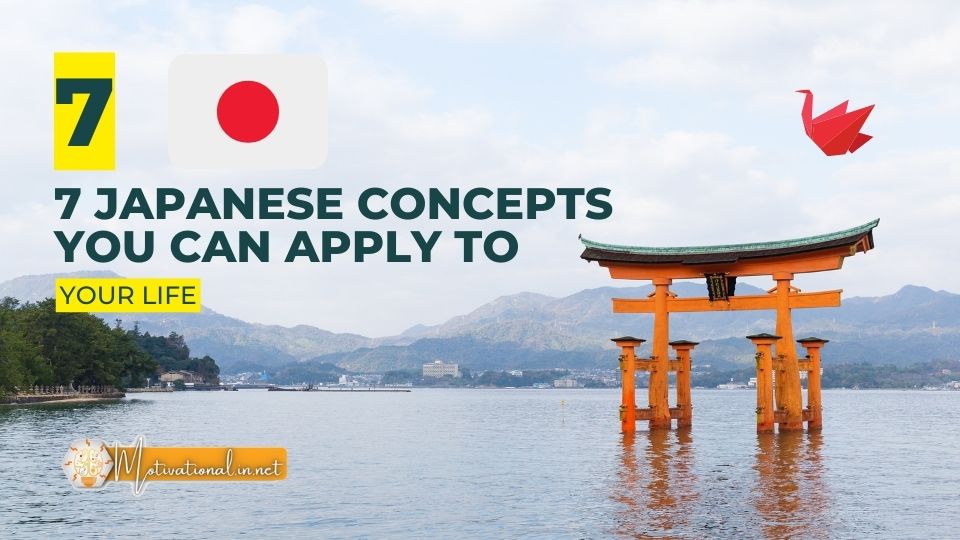7 Japanese Concepts You Can Apply to Your Life (Right Now)
Are you looking for ways to enrich your life and find deeper meaning in your daily experiences? Look no further than the wisdom of Japanese culture. Japan is renowned for its unique concepts and philosophies that promote well-being, mindfulness, and personal growth. In this article, we'll explore seven Japanese concepts that you can easily integrate into your life, bringing about positive change and a fresh perspective.
Table of Contents
- Introduction
- Wabi-Sabi: Embracing Imperfection
- Ikigai: Finding Purpose and Passion
- Shinrin-Yoku: Forest Bathing for Inner Peace
- Kintsugi: Embracing Resilience
- Mono No Aware: Appreciating Transience
- Omotenashi: Cultivating Hospitality
- Kaizen: The Power of Continuous Improvement
- Conclusion
- Frequently Asked Questions (FAQs)
Introduction
Japanese culture is a treasure trove of wisdom, offering unique concepts that can significantly enhance the quality of your life. From the appreciation of imperfections to the pursuit of continuous improvement, these ideas hold valuable insights that can lead to a more fulfilling and meaningful existence. Let's delve into these concepts and explore how they can be integrated into your daily routine.
Wabi-Sabi: Embracing Imperfection
Wabi-sabi is a concept that celebrates the beauty found in imperfections, impermanence, and authenticity. Instead of striving for an unattainable ideal, wabi-sabi encourages us to find beauty in the natural cycle of growth and decay. Embracing this concept can help you let go of the need for perfection, reducing stress and fostering a greater sense of contentment.
Ikigai: Finding Purpose and Passion
Ikigai is often described as the "reason for being." It's the intersection of what you love, what you're good at, what the world needs, and what you can be paid for. By discovering your ikigai, you can unlock a deep sense of purpose and fulfillment, leading to a more balanced and harmonious life.
Shinrin-Yoku: Forest Bathing for Inner Peace
Shinrin-yoku, or forest bathing, involves immersing yourself in nature to promote relaxation and mental well-being. This practice has been scientifically proven to reduce stress hormones and enhance mood. By spending time in nature regularly, you can experience a greater sense of tranquility and connectedness.
Kintsugi: Embracing Resilience
Kintsugi is the art of repairing broken pottery with gold or silver lacquer, highlighting the cracks and imperfections rather than hiding them. This concept teaches us that our scars and challenges contribute to our unique beauty and strength. Embracing our "broken" parts can lead to a stronger sense of self-acceptance and resilience.
Mono No Aware: Appreciating Transience
Mono no aware refers to the bittersweet awareness of the impermanence of life and the appreciation of fleeting moments. By embracing this concept, you can learn to savor the present and find joy in the transient beauty of life's experiences, both big and small.
Omotenashi: Cultivating Hospitality
Omotenashi is the Japanese art of hospitality and service. It involves wholeheartedly caring for others and anticipating their needs. By incorporating omotenashi into your interactions, you can deepen your relationships, foster empathy, and create a more compassionate and harmonious environment.
Kaizen: The Power of Continuous Improvement
Kaizen emphasizes the value of continuous improvement and making small, incremental changes over time. By adopting a kaizen mindset, you can break down overwhelming goals into manageable steps, leading to consistent progress and personal growth.
Conclusion
Integrating these seven Japanese concepts into your life can bring about profound positive changes. From embracing imperfection to fostering resilience and finding your ikigai, each concept offers a unique perspective on how to lead a more meaningful and fulfilling life. By applying these principles, you can experience greater contentment, mindfulness, and a deeper connection to the world around you.
Frequently Asked Questions (FAQs)
Can I apply these concepts even if I'm not familiar with Japanese culture? Absolutely! These concepts are universal and can be integrated into any cultural context.
How can I start practicing forest bathing in a city environment? Find local parks or green spaces to spend time in and immerse yourself in nature's beauty.
Is it necessary to find my ikigai to be happy? While not necessary, discovering your ikigai can provide a strong sense of purpose and fulfillment.
How can I embrace the idea of impermanence in my daily life? Practice mindfulness and focus on appreciating the present moment.
What are some simple ways to incorporate omotenashi into my interactions? Pay attention to the needs and feelings of others, and offer assistance whenever possible.
